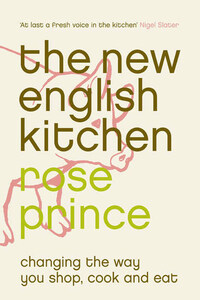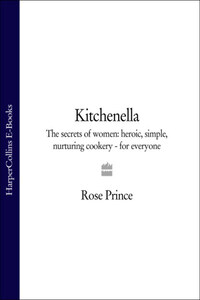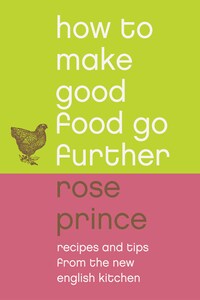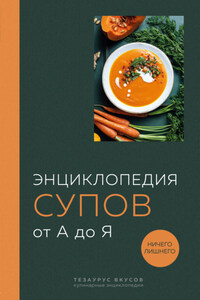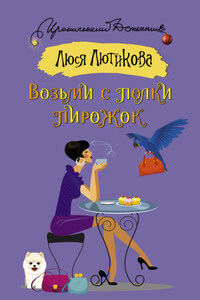When you eat a langoustine, it gives you a present of its shell. Take that shell, toast it in a pan with some others, then boil in water – and you have a broth. That broth becomes one to pour over rice noodles with spices … You bought something good for a meal and it gave you two things good.
This simple idea not only enables you to eat well – twice – but is also a solution to the contemporary kitchen dilemma: how to make better-quality food something everyone can eat every day. This is possible not only through clever recycling – making, say, roast chicken leftovers into stock and so bringing to the table a second dish of risotto plus a third of smooth vegetable soup – but also by finding economical ways of buying the best, such as buying direct from farms using home delivery, or scouting vegetable stalls for good deals on seasonally abundant vegetables.
The New English Kitchen was born of a furious determination to connect the paths of two parallel stories. The first is a happy tale of lovely food, made using good recipes created by television chefs. It has been hard to ignore the cookery boom in all its guises. Up front, the message is all-embracing: consume, and choose what you want; it is all there in the lifestyle pages of the weekend supplements for the taking, cooking and eating.
The second story is unsettling. Looking regularly at the daily papers, it is clear that there is something wrong: the food chain is in crisis. Resources have buckled under consumer and retailer pressure to produce cheap food. Unpleasant stories emerge about food-related diseases in livestock and humans; UK farming faces financial ruin, the global market unfair, food is adulterated with chemicals and a growing number of children so unhealthy due to overeating fatty, sugary food that their parents may well outlive them. Rarely does a week pass without headlines reporting more trouble in the food industry.
Flick back to the recipe feature in the magazine – and to be quite frank you could be on another planet. Enjoy! Chargrill some more tiger prawns – to hell with the devastating effect warm-water prawn farming has had on the mangrove forests! Teriyaki another chicken breast – never mind where it comes from!
But beyond the headlines, there is a fledgling army of farmers, food producers, campaigners and food writers who are giving food and cookery back their integrity. More vital still is the consumer who wants to buy the best in order to eat well every day. This book is for you. It will help your good intentions into practical reality, proving that sustained good eating need not use up all your money and time.
The New English Kitchen’s philosophy could equally be applied in Scotland, Wales, Ireland, the United States of America, Australia and Canada. It already exists in many European countries where the culture of home cooking has not faltered over the generations in the way that it has here. Focusing on English food was not an attempt to narrow the style but to broaden it, taking on the incredible variety of foods available in this province. True English food has always gone far beyond the Mrs Beeton concept of plain food economically produced. The national cuisine may be fossilised in people’s minds as pies, roasts and nursery puddings, but there is now no reason why it could not include the rice noodle dishes of Southeast Asia or the delicious food of the Mediterranean. This is after all a country with a five-hundred-year-old history of food piracy: borrowing ideas from other shores, importing their raw materials and learning to cultivate them in our own soil, or rear new animal species on our pastures.
Then there is the impact of the last 50 years’ food writing tradition. Without the great, inspirational books of those very English writers, Constance Spry, Elizabeth David and Jane Grigson, the good food renaissance would have been snail-pace slow. Multiculturalism and affordable worldwide travel have conspired to make English food in the 21st century more interesting still. So among the recipes in The New English Kitchen you will find pilaffs and soufflés, noodle soups and pasta dishes. They have every right to be considered as English as beef and Dover sole. There is one proviso: as far as possible, all the recipes must make use of UK-grown ingredients.
UK specialist and artisan food producers face a tough future, and in England the situation is uniquely difficult. I work in London but escape to a rented cottage in the West Country whenever possible. Bridging both worlds, urban and rural, has been insightful; essential to both my research and to the formation of the New English Kitchen concept. The English rural vote is small – and it affects the future of the food produced in the countryside. Small-scale farmers have often described as plain hostile the attitude of our authorities towards them. Enterprise is threatened constantly by both overseas competition and the crippling cost of the regulatory regime imposed on the food industry. Loyalty to the best that the country can produce will go a long way to help protect artisan food from extinction. Inside every shopper’s wallet is power, no matter how large or small the amount.
